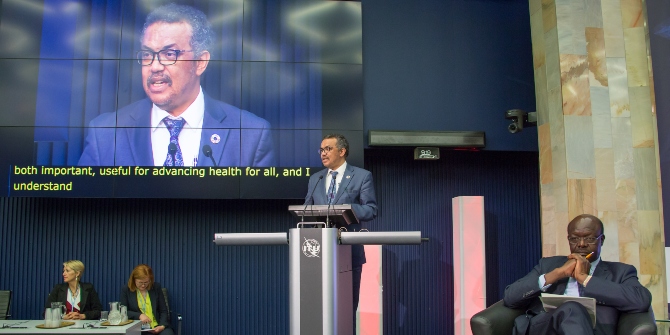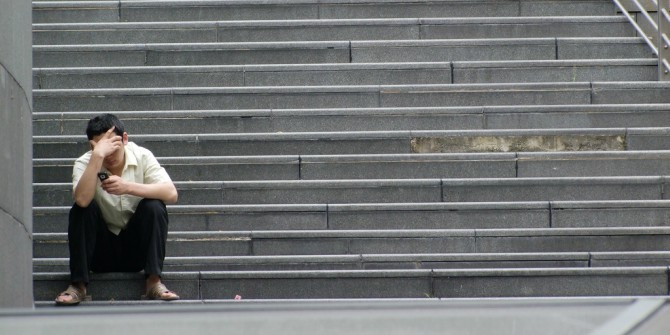
The writing on the wall from the Covid-19 pandemic is the critical role that detecting, tracing, and containing contagion for infectious diseases can play in saving lives across the globe. Yet, the World Health Organization’s hobbled and weak handling of the crisis has left a lot to be desired. The W.H.O. has arguably failed to weather this crisis, but it must succeed in the future. We argue that this requires rethinking both its mission and its tools.
To do this, one must understand what distinguishes this pandemic from other health risks. First, in economics-speak, there are large global “externalities”: as with all infectious diseases, your health depends not just on your behaviour, but also on that of others. Secondly, there is a ‘weak-link’ element to government action to contain the virus: its contagiousness and capacity to travel far means we are all vulnerable if one government mismanages the crisis (China’s initial handling of the outbreak was in this case the ‘weak-link’ putting the whole world at risk). Third, as the mounting global death toll makes increasingly clear, the pandemic’s costs in terms of lives and livelihoods are huge, immediate, and visible, making the case for concerted action easier than for other global risk, such as climate change.
These three features of the pandemic imply that international coordination is needed to both respond to this pandemic and prevent future ones. Worryingly, they also suggest that in the absence of global coordination governments might opt for isolationism. Closing borders so that foreigners can’t bring the disease in may seem like a reasonable (and politically expedient) short-term response but will have huge human and economic costs over a longer period.
There is an alternative. The world has already experienced a ‘trial-run’ for coping with major global risks: airlines security in response to 9/11. Like the current pandemic, terrorism posed an extreme threat and showed that the international community is only as strong as its weakest member. Significant progress was made in countering this threat by establishing universal air-travel security standards and monitoring their enforcement.
How can the WHO reinvent itself and more effectively prevent and contain future pandemics? For this, three conditions must be met.
First, the W.H.O needs a narrower focus. A disease will have to meet three criteria for W.H.O. intervention: large global externalities, high mortality risk and a ‘weak-link’ aspect to government action. Eradicating malaria, for example, is an extremely worthwhile goal, but as the disease does not travel much internationally, direct intervention (as opposed to financial support) by an international institution is not necessarily required. Since its creation the W.H.O has experienced substantial mission creep, with its current agenda including a wide range of aspects of public health. Some of this is unavoidable given the founding principles of the W.H.O., but a balance needs to be struck as multiplicity of missions makes the institution less focused on achieving key goals and harder to hold accountable on easy-to-judge metrics. Following the model of recent global public health funds with a narrow focus, the W.H.O. must redefine its core mission around the global response to infectious diseases – let us call this hypothetical division GRID. Other aspects of public health could be left to its research and advisory departments.
Second, GRID needs the capacity — beyond what is granted by the international health regulations — to warn and, if necessary, sanction countries that do not follow its rules. We as a global community have given the World Trade Organization powers to impose economic sanctions on its member states. Avoiding another pandemic is at least as worthy a goal as increasing global trade; it should be backed with similar sanctioning power. Sanctions should, however, be carefully designed with the aim being preventive not punitive. Imposing sanctions on a country where a pandemic starts as a deterrent would not be credible, given GRID’s mission to support countries when such a disaster strikes. As with airlines security, one would expect not to have to use sanctions if they are effective in eliciting compliance. Their presence and a credible mechanism of enforcement would create common expectations that others will comply.
Finally, GRID would need a budget adequate to the task. The W.H.O.’s current annual budget, roughly $2bn, is not much higher than that of the main hospital in its host city, Geneva. Rule of thumb calculations suggest this is grossly inadequate. Consider, for example, what preventing the international spread of a highly contagious disease through air travel could require. Taking the estimated cost of a Covid-19 test ($10) and the number of air passengers in 2018 (4.2 bn) as a benchmark, $42 bn could be needed for testing international travellers alone. Even half that number is 10 times the W.H.O.’s current budget.
How could GRID raise money? One financing mechanism could take the form of ‘user-fees’ on those benefitting the most from the global movement of people, something that GRID will protect. Multinational corporations top that list. Researchers estimate that they made $1.7trn in profits from their international activities in 2015, a non-trivial share of which is booked in tax havens and therefore subject to little taxation. A small 5% tax on these international profits alone would generate $85 bn. International air passengers and airlines could also be asked to contribute, as the main direct beneficiaries from testing infrastructure in airports. These proposals are ambitious but not without real-world precedent. UNITAID, a global health fund, is already partially funded by a tax on international air travel levied by several countries. Importantly, giving GRID its own sources of funding will free it from the W.H.O.’s current reliance on voluntary contributions by member states and shield it from the undue political influence of powerful countries.
If we neglect the writing on the wall about the W.H.O., the uncoordinated responses of national governments will hurt ordinary citizens across the globe, especially the poorer and more vulnerable among us. The virus does not respect borders or walls; our response must also transcend them.
♣♣♣
Notes:
- This blog post is a modified version of an article that appeared on VoxEu.
- The post expresses the views of its author(s), not the position of LSE Business Review or the London School of Economics.
- Featured image by ITU Pictures, under a CC-BY-2.0 licence.
- When you leave a comment, you’re agreeing to our Comment Policy
 Lucie Gadenne is an assistant professor of economics at Warwick University, a research fellow at the Institute for Fiscal Studies and CEPR research affiliate. Lucie’s research focuses on public policy in developing countries and in particular on the optimal design of taxes and subsidies, the equity and efficiency effects of taxation in the presence of large informal sectors and the effects of tax capacity on government accountability. Prior to joining Warwick, she was a postdoctoral fellow at University College London. Lucie holds a PhD from the Paris School of Economics.
Lucie Gadenne is an assistant professor of economics at Warwick University, a research fellow at the Institute for Fiscal Studies and CEPR research affiliate. Lucie’s research focuses on public policy in developing countries and in particular on the optimal design of taxes and subsidies, the equity and efficiency effects of taxation in the presence of large informal sectors and the effects of tax capacity on government accountability. Prior to joining Warwick, she was a postdoctoral fellow at University College London. Lucie holds a PhD from the Paris School of Economics.
 Maitreesh Ghatak is a professor of economics at LSE, and a fellow of the British Academy. He is co-editor of Economica, having formerly served as the editor-in-chief of the Journal of Development Economics, managing editor of the Review of Economic Studies, and co-editor of the Economics of Transition. He is the director of the development economics research programme at the Suntory Toyota International Centre for Economics and Related Disciplines (STICERD). He previously taught at the University of Chicago. His work focuses mainly on issues in development economics, public economics and economics of organisations. He has a master’s degree from the Delhi School of Economics and PhD from Harvard University.
Maitreesh Ghatak is a professor of economics at LSE, and a fellow of the British Academy. He is co-editor of Economica, having formerly served as the editor-in-chief of the Journal of Development Economics, managing editor of the Review of Economic Studies, and co-editor of the Economics of Transition. He is the director of the development economics research programme at the Suntory Toyota International Centre for Economics and Related Disciplines (STICERD). He previously taught at the University of Chicago. His work focuses mainly on issues in development economics, public economics and economics of organisations. He has a master’s degree from the Delhi School of Economics and PhD from Harvard University.






Competencies in economics and financing are best complemented with a multidisciplinary approach to include infectious diseases and public health as well as sociology, anthropology, politics, diplomacy and management and many other disciplines.
Today the living historical lessons from the ongoing COVID-SARS 2 pandemic is that weak country public health system and national health services in UK, USA, Europe and many others require a truly independent professional public health inquiry followed by reform, major investment and reorganization just like the World Health Organization at the global level. Will the market forces of economics and profit allow for investing in public health as opposed to expensive private and public medical care and maximizing profit driven production with perpetuation of poverty and inequity?
Global health financing has been massively increasing since 2000 with the launch of numerous vertical and parallel, global public-private health partnerships and health financing mechanisms. UNITAID is one of the many in crowded field. Many others such as UNIAIDS, GF, GAVI, RBM , Stop TB The new kid on the block thanks to Ebola and COVID is CEPI. Many of them started and continue with investment by the UK government and many others in the Group of 7 countries as part of Globalization of Health. WHO as the lead global public health agency continues to be chronically under-funded and marginalized by strong global health market forces driven by personal egos and survival, top heavy structure survival and profit and power at all costs.
Today to look at pandemic of COVID in isolation from other global infectious and disease pandemics like seasonal influenza, tuberculosis, measles, dengue, malaria, yellow fever etc and non-communicable disease like mental illness, cardiovascular disease, diabetes, cancer etc is ignoring the reasons for major risk of disease being inequity, poverty and poor living and working environments. Prevention and control of disease is what WHO was created for and remain its core business. Over the last two decades WHO has become more and more scientific and academically managed and politically led and has lost its core of independent public health competencies in supporting and working to strengthen its member states public health and national health services and systems. The result is that WHO today does everything in theory and nothing in practice and has been parasitized from within and outside. Ebola and COVID has not only shaken the foundations of global WHO but has also exposed the weakness and gaps in country public health services and national health services in most countries in the world expect a very competent few.
True WHO needs to narrow its focus and there is need and demand to look at increasing the mix of innovative health financing mechanism to increase sustainable financing of three levels of WHO to provide leadership and strong capacity in public health. This is required for consistency and independence in global forecasting, prevention, preparedness, early warning, rapid response and control of disease outbreaks and pandemics as well as coordinating effective and efficient disease control and elimination such as polio, measles, guinea worm, Kalazar and many others. The bottom line is a true WHO restructuring is required to reform a top heavy and fragmented political organization with numerous top senior managers and middles level managers with duplicating program structures such as Polio, Immunization, Malaria, NTD and now COVID and Respiratory Infection Control and many others. This overall heavy central administrative burden and bureaucracy needs to move towards a lean action oriented and decentralized high-performance organization better financed and embedded within all member country public health structure and systems. This was the reason for the historical success of WHO in its first 50 years in controlling disease with a mission on providing Primary Health Care based on a vision of Health for All. Sanctions may work in global politics but global public health requires professional and neutral engagement, solidarity and collaboration based on mutual respect and trust.